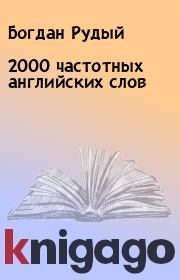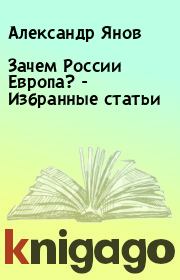Александр Янов - The Russian challenge and the year 2000
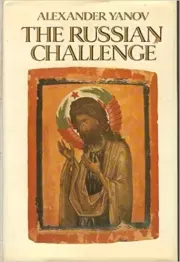 | Название: | The Russian challenge and the year 2000 |
Автор: | Александр Янов | |
Жанр: | Старинная литература | |
Изадано в серии: | неизвестно | |
Издательство: | неизвестно | |
Год издания: | 1985 | |
ISBN: | неизвестно | |
Отзывы: | Комментировать | |
Рейтинг: | ||
Поделись книгой с друзьями! Помощь сайту: донат на оплату сервера | ||
Краткое содержание книги "The Russian challenge and the year 2000"
Argues that the West must support the Soviet Union's emergence from political and cultural isolation in order to prevent the rise to power of Russian fascism
Читаем онлайн "The Russian challenge and the year 2000". [Страница - 2]
- 1
- 2
- 3
- 4
- . . .
- последняя (99) »
To appreciate fully the degree of shock I experienced in listening to Hough and Pipes, the reader must imagine how, say, the author of a book about Catholicism in the sixteenth century would have felt, having heard from respected academics that all Europeans were
Catholics at that time and that the only difference between Marun Luther, the leader of the Reformation, and Ignatius Loyola, leader of the Counter-reformation, was that one was a bad Catholic and the other a good one. In other words, Protestantism was not an independent ideology in its own right that gave 'se to a precisely outlined political doctrine in opposition to Catholicism, but only bad Catholicism.
In May 1981, dupng that conference. I began to regret having published my Russian New Right as early as 1978 — outs.de the context of the Western intellectual debate on Russia. Only recently arrived from Moscow, having been nurtured in a completely different school of thought and fresh from embittered skirmishes with Russian nationalists back at home, I had naively assumed that I was speaking in one and the same conceptual language as my new American readers. 1 believed that the phenomenon of Russian nationalism meant for them the same as it did for me and my fellow-thinkers and opponents in Russia: an age-old, powerful and attractive ideology, the main antagonist to traditional Russian liberalism (Westernism). I assumed that my readers wouid know its history and its political doctrine, that they would know how graphically this doctrine repudiates the central postulate of Western political thought — the separation of executive, legislative and judicial powers — offering instead a medieval postulate about the separation of functions between secular and spiritual authorities I assumed that I would not need to explain to my readers that this doctrine conceives of its political deal not as popular representation, but as a nation-family not requir'ng political guarantees; that separation of chuich from state is anen to '.t; that, in other words, the ideology of Russian nationalism is antagonistic to all the main principles on which modern democracy is based,
Hough and Pipess duet convinced me that there is a chasm between how the term Russian naiionalism is used in Washington and how it is used in Moscow. This rift seemed all the deeper to me when I learned that, m certain run-of-the-mill courses on the subject at American universities, the Westernism of the last century is calmly interpreted as a component part of Russian nationalism, thus confusing the Sakharovs of Russia's past with her Solzhenitsyns, just as American sovietologists had done in Washington, before my eyes with respect to modern times. Then, after another conference in Washington in October 1985, 1 became almost despairing when the American politicians and experts present concluded almost unanimously U was the sole exception) — and entered into the conference record!
— that Russian nationalism is 'the operative ideology' of the present- day Soviet government. The conceptual language of my readers dearly had nothing in common with the language in which my book was wrtten.
As a rule, this conceptual language does not view Russian nationalism as a particulai ideology, or even as a political doctrine. It sees it more as a feeling or seni ment which is merely expressed by ideological symbols. These symbols can either be positive (and then this nationalist sentiment is called patriot >ra) or negative (in which case it is called chauvinism). For what lies between these two emotional poles — nationalism as such, the deology of nationalism — there is no symbol. It is a kind of no one's land, a blank spot on the ideological map, lacking political substance of its own and therefore accepting any content the observer brings to it.
There is no doubt that the Soviet leadership, as long ago as the 1930s, incorporated symbols of patriotism into its own deology in order to exploit people's patriotic emotions. However, though this may have confused Western observers, it did not fool Russian nationalists. The ideological explosion of the 1960s described in The Russian New Right was the most convincing ev: Jence of the gaping chasm between the 'emotional' exploitation of ideological symbols in Soviet propaganda and the genuine ideolog} of Russian nationalism If nationalism really were serving as the 'operative deology' of the Soviet government, the revolt of Russian nationalists that erupted in the 1960s almost simultaneously in both the dissident samizdat and the officially censored Soviet press, would defy explanation. Russian nationalists graphically and unambiguously refused to recognize the official Soviet ideolog> as their own, regardless of how many patriotic symbols it expropriated. The Soviet government, for ts part, liKewise refused to recognize the Russian nationalists as their own. On the contrary, it unleashed its KGB on them, hustling some off to pi *son and forcing others to fall silent. Why?
Neither Jerry Hough nor Richard Pipes can pro\ ide an answer to this decisive question They confuse patriotic emotions (or, 'n the other interpretation, chauvinist excesses) with the ideology of Russian nationalism, and that has made it impossible for them to understand the nature of the phenomenon.
This, apparently, would explain the unexpectedly different reactions of readers to The Russian New Right. Some saw it as an attack on Russian patriotism and were duly offended. Other interpreted it as an assault on Russian chauvinism and duly rejoiced. In reality, however, the book was neither one nor the other. Generally, it was not intended to have any relation to emotions whatsoever It described the — at first glance — inexplicable resurrection of the ideology of Russian nationalism in the modern-day Soviet Union (where, according to all sovietological cliches, such a thing could not happen). It dealt with Russian nationalism's revolutionary origins in the mid-1960s, its split into a dissident faction and an establishment faction toward the end of that decade, and the transformation of the latter into the USSR's unofficial shadow ideology. It went on to describe how ihese two factions grew ideologically closer and how they were repressed by the police in the mid-1970s. The book also offered an hypothesis about the potential political consequences for Russia and the world in the event of a new, and this time victonous, resurrection of the ideology of Russian nationalism at the end of the second Christian rii llennium.
I tried to show the reader how Russian nationalism's main tiaits were formed, its militant anu-Westernism, rendering it similar to the .deology of the Ayatollah Khomeini- ts dogmatism and ntolerance. bringing it closer to contemporary Soviet Marxism; its extremism and explosive potential, resembling Bolshevism abroad at the beginning of the century However, even those re\iewers most well disposed toward the book did not take all this seiiously. For the majority of them it was a book about a bizarre chauvinist uing (the 'lunatic fringe ) of Soviet dissidence, a kind of Russian Ku Klux Klan; interesting and even entertaining, with a mass of exotic details, but lacking any immediate political significance
Suppose, right at the start of the twentieth century, immediately after the emergence
--">- 1
- 2
- 3
- 4
- . . .
- последняя (99) »
Книги схожие с «The Russian challenge and the year 2000» по жанру, серии, автору или названию:
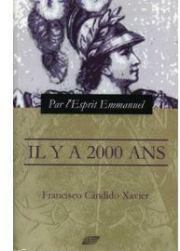 |
| Francisco Candido Xavier - Il y a 2000 ans Жанр: Старинная литература Год издания: 2008 |
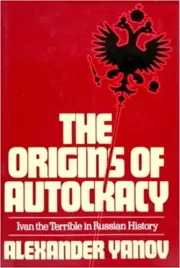 |
| Александр Янов - The Origins of Autocracy Жанр: Старинная литература Год издания: 1981 |
Другие книги автора «Александр Янов»:
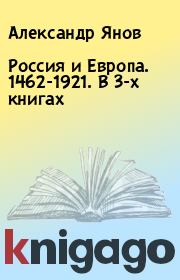 |
| Александр Янов - Россия и Европа. 1462-1921. В 3-х книгах Жанр: Публицистика Год издания: 2008 |
 |
| Александр Янов - The Origins of Autocracy Жанр: Старинная литература Год издания: 1981 |
 |
| Александр Янов - The Russian challenge and the year 2000 Жанр: Старинная литература Год издания: 1985 |


